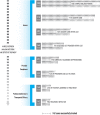Rethinking integrated service delivery for malaria
- PMID: 36962405
- PMCID: PMC10021790
- DOI: 10.1371/journal.pgph.0000462
Rethinking integrated service delivery for malaria
Abstract
Despite worldwide efforts and much progress toward malaria control, declines in malaria morbidity and mortality have hit a plateau. While many nations achieved significant malaria suppression or even elimination, success has been uneven, and other nations have made little headway-or even lost ground in this battle. These alarming trends threaten to derail the attainment of global targets for malaria control. Among the challenges impeding success in malaria reduction, many strategies center malaria as a set of technical problems in commodity development and delivery. Yet, this narrow perspective overlooks the importance of strong health systems and robust healthcare delivery. This paper argues that strategies that move the needle on health services and behaviors offer a significant opportunity to achieve malaria control through a comprehensive approach that integrates malaria with broader health services efforts. Indeed, malaria may serve as the thread that weaves integrated service delivery into a path forward for universal health coverage. Using key themes identified by the "Rethinking Malaria in the Context of COVID-19" effort through engagement with key stakeholders, we provide recommendations for pursuing integrated service delivery that can advance malaria control via strengthening health systems, increasing visibility and use of high-quality data at all levels, centering issues of equity, promoting research and innovation for new tools, expanding knowledge on effective implementation strategies for interventions, making the case for investing in malaria among stakeholders, and engaging impacted communities and nations.
Copyright: © 2022 Ansah et al. This is an open access article distributed under the terms of the Creative Commons Attribution License, which permits unrestricted use, distribution, and reproduction in any medium, provided the original author and source are credited.
Conflict of interest statement
The authors have declared that no competing interests exist.
Figures




References
-
- World Health Organization. World malaria report 2021. Geneva: World Health Organization; 2021. Available: https://apps.who.int/iris/handle/10665/350147
-
- Global Technical Srategy For Malaria 2016–2030. World Health Organization; 2015.
-
- World Health Organization. 2019 World Malaria Report. Geneva: World Health Organization; 2019.
-
- Chanda-Kapata P, Ntoumi F, Kapata N, Lungu P, Mucheleng’anga LA, Chakaya J, et al. Tuberculosis, HIV/AIDS and Malaria Health Services in sub-Saharan Africa–A Situation Analysis of the Disruptions and Impact of the COVID-19 Pandemic. International Journal of Infectious Diseases. 2022; S1201971222001734. doi: 10.1016/j.ijid.2022.03.033 - DOI - PMC - PubMed
-
- Stakeholder engagement and partnerships during and beyond COVID-19 [Webinar]. 2021. Available: https://sustainabledevelopment.un.org/content/documents/27552Partnership...
